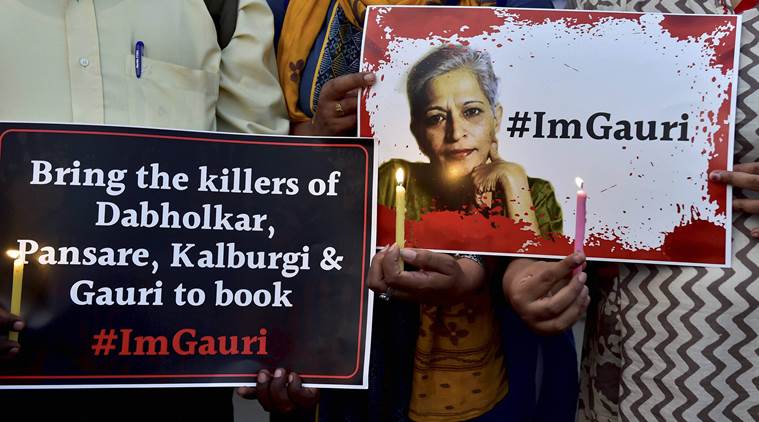The cold blooded murder of veteran journalist Gauri Lankesh in Bangalore had sent shock waves across India’s journalist community and civil society. Alarmed at the audacity and frequency of such attacks a group of civil society member and journalists came together in London on Oct 24 to demand that the ruling dispensation in India accept that it has done precious little to protect fearless members of the fourth estate, especially those who have the penchant to investigate and publish anti-establishment stories.

Image: PTI
At a public meeting held at the University of Arts, London, academics, activists and Labour Party members got together for a panel discussion titled ‘Standpup to the Murder of Dissent: Stop the Killing of Journalists in Modi’s India’. Indian Human Rights activist Teesta Setalvad, who has often gone toe to toe with Prime Minister Modi began with a presentation emphasizing not only the killing of journalists, but also that the perpetrators of most attacks were allies of the ruling party and hence enjoyed a sense of complete impunity. “We need to reiterate that the government which is supposed to uphold the constitution is not run by the Parliament wing of the BJP, but by the RSS, an organization committed to un-constitutionalism,” said Setalvad.
Tim Dawson President of the UK’s National Union of Journalists emphasised the need for the British government to challenge the Modi government on its Human Rights record. He said, “Mob violence in India is like the Ku Klux Klan in the southern states in America in the 1930s when the government colluded by turning a blind eye. The Modi government’s apparent license for mob violence is an incredibly dangerous development.” He believes that journalists are no more important than other members of the public but they have a capacity to shine a light on what is really happening. “We need to see the rule of law observed, perpetrators held to account and prosecuted. British journalists have a job of work to do, they can be insular. They need to say to our government that if you have dealings with the Modi government, human rights must have centre stage”, he said.
Other speakers included journalist and author Rana Ayyub who paid a moving tribute to Gauri Lankesh the celebrated journalist who was shot dead outside her home on 5 September. She also spoke about her experiences of acute harassment and surveillance and said that constant surveillance was something which not only journalists but dissenters face in India.
Journalists from other parts of the world also shared their experiences. Mohammed Aboulenein, Head of News and current affairs at AlArabi TV spoke about the harassment which their channel had faced from the Egyptian government and the acute danger which journalists faced in the Middle East. He described the experiences of Al Jazeera journalists who were imprisoned simply for writing the truth. He concluded saying, “Dissenting journalists must speak out together and for each other”.
Nitasha Kaul, academic and writer spoke about the experiences of the Kashmiri media and the long-running censorship, closure of press outlets and newspapers and the frequent suspension of the internet and phone networks in the Kashmir valley.